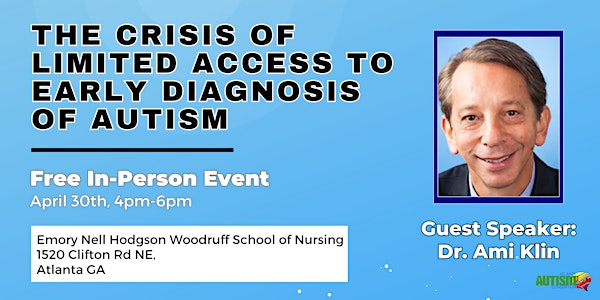
The Crisis of Limited Access to Early Diagnosis of Autism
Developmental social neuroscience that shows promise in generating novel tools for objective and cost-effective early diagnosis of ASD.
Date and time
Location
1520 Clifton Rd NE
1520 Clifton Road Northeast Atlanta, GA 30307About this event
About the event:
Join the Atlanta Autism Consortium at the Emory Nell Hodgson Woodruff School of Nursing on April 30th for this event. This program will feature a presentation by Dr. Ami Klin, the Director of Marcus Autism Center and a Georgia Research Alliance Eminent Scholar Professor, as well as the Division Chief of Autism and Developmental Disabilities at Emory University School of Medicine.
This in-person event is free, but registration is required as space is limited. Parking is free in the Michael Street deck on Rollins Way.
About the Presentation:
Early identification and diagnosis of autism spectrum disorder (ASD) is necessary to promote access to early treatment, a critical factor in optimizing children’s lifetime outcomes. And yet, diagnosis is often late, delaying interventions to a time in which symptoms have aggravated and communication skills already show impairing differences. This presentation illustrates progress in developmental social neuroscience that shows promise in generating novel tools for objective and cost-effective early diagnosis of ASD. We focus on research of social visual engagement, which is the way infants and toddlers look at and learn from their social environment. Moment-by-moment quantification of social visual engagement is yielding measures that are beginning to approximate best-practice procedures used by experienced clinicians in the assessment of young children. This progress and potential solutions have public health importance because experienced clinicians are limited in number, and specialized clinical assessment services tend to be lengthy, costly, and plagued by extended wait time, all of which contributing to limited access, particularly in the case of low-resource families.
This work illustrates a wider effort to advance biomarker-based measurements intended to develop better and more efficient tools and procedures for screening, diagnosing and monitoring treatment response in children with ASD. The advent of such tools could increase access to early diagnostic services and promote efficiencies in early treatment delivery, with the ultimate goal of ensuring that children with ASD are afforded the services they need to thrive.
About Dr. Klin:
Ami Klin, PhD, is the Director of Marcus Autism Center and a Georgia Research Alliance Eminent Scholar Professor, as well as the Division Chief of Autism and Developmental Disabilities at Emory University School of Medicine. Dr. Klin obtained his doctorate from the University of London and completed clinical and research post-doctoral fellowships at the Yale Child Study Center. He directed the Autism Program at the Yale Child Study Center, Yale School of Medicine, until 2010 where he was the Harris Professor of Child Psychology and Psychiatry.
Dr. Klin’s primary research activities focus on the social mind and brain and the developmental aspects of autism spectrum disorder (ASD) from infancy through adulthood. These studies include novel techniques, such as the eye-tracking laboratories co-directed with Warren Jones, PhD, that allow researchers to see the world through the eyes of individuals with autism. These techniques are now being applied in screening toddlers who are at risk for autism.